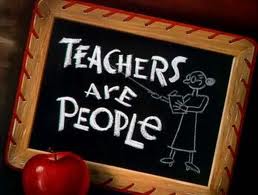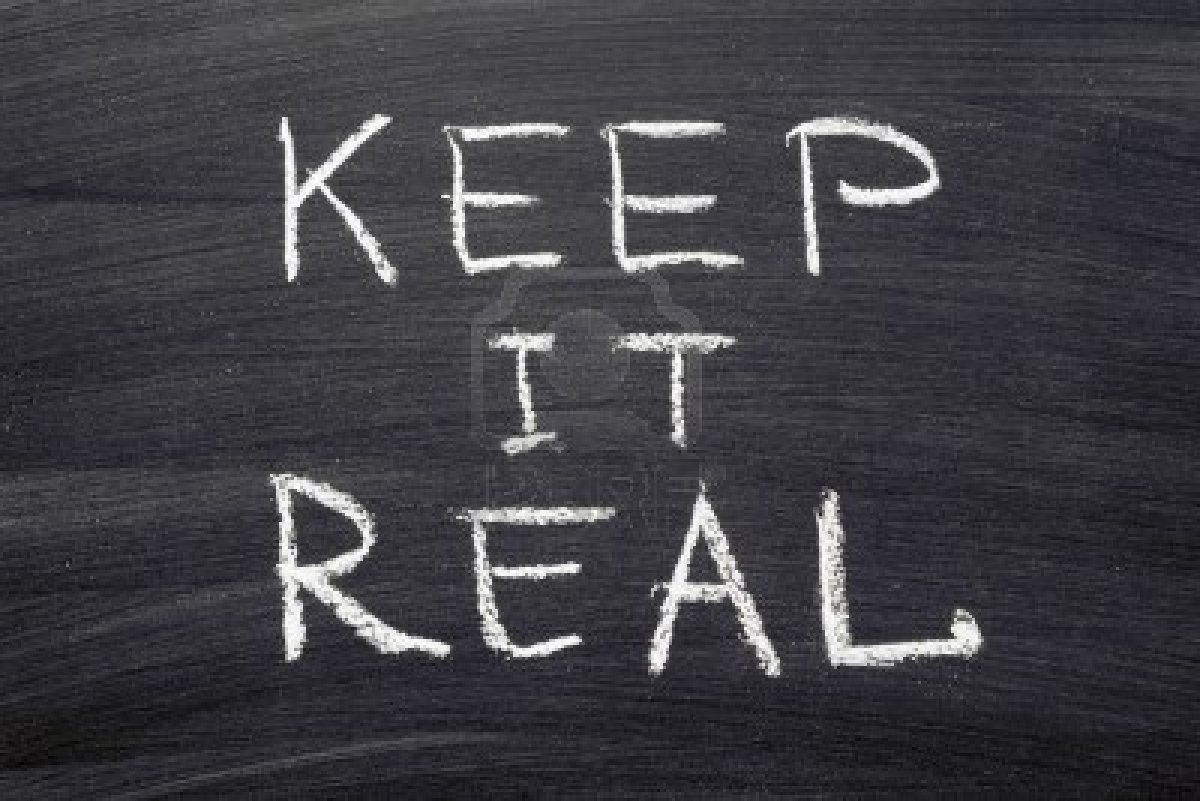The age old question persists: Are teachers real people?
I remember one morning in high school when Mr. Yach’s wife stopped in to drop off his V8 during Freshman English. I was amazed that he had a wife and that he drank V8! I was dizzy with this insider info: It felt like Teacher TMZ.
Another oft’ repeated story in my family is when one of my sisters saw our kindergarten teacher...wait for it...wait for it...smoking a cigarette!

She was not on school property, she was not at a school event, and it was years after we’d had her as a teacher, but none of that made the bite any less venomous. Mrs. Hintzman was smoking a cigarette! Our blood ran cold, our memories had just been sold. This was at least as bad as J. Geiles discovering the fate of his childhood girlfriend.
And so, becoming a teacher, I was well aware of the importance of reputation and the odd fascination that can surround teachers’ personal lives.
Case in point: I am a resident of the small community in which I teach. So although I’ve lived here almost 20 years, I’ve never stepped foot into the legendary annual ETBT (East Troy Beer Tent) because...I’m a resident of the small town in which I teach.
Those types of decisions are no brainers.
The harder ones involve things that matter more - my beliefs, my opinions, my values.
In my younger years, this was not a problem. I grew up in a family that had dinner-table debates, intense ones which often included the use of dictionaries and encyclopedias and occasionally featured my dad’s fist hitting the table, spilling our glasses of milk. We were raised to speak our minds and to back up our opinions.
High school and college provided similar opportunities. As an editorial writer for The Mustang Express and The Marquette Tribune, I became accustomed to using the written word to speak my peace and to challenge conventional thinking.
However, public education, I discovered, is a slightly more complicated arena.
One of my first years teaching, our local library referendum was overwhelmingly defeated on the same day the US Congress allocated billions of additional funding for the war in Iraq (Part I, that is). My hot little fingers (mimicking my hot little temper) pounded out a letter to the editor singing the injustice of it all.
Version 1 was no holds bar. Then, I had my husband--Mike Felske a.k.a. My Filter--read it and help me tone it down, making my liberalness a tad less flaming. Then, and only then--or so I thought--did I send it off to the East Troy Times.
Not until one of my students, jubilantly quoting me, entered my classroom the next week (one who would regularly don a homemade T-shirt reading “Books Not Bombs!”) did I realize it was the pre-edited version of my letter that had somehow made it to the paper. A deep crimson crawled down my face as I realized my untamed message was now community-wide.
Backlash included a few weeks of ugly gazes (some legit, others just my paranoia, I’m sure) at the grocery store and post office. Soon enough, though, things were back to normal but with a slightly more savvy me.
But back to our question: Are teachers real people? Or, less hyperbolically, as a public school teacher, to what extent can I be true to myself and my beliefs in and outside the classroom?

Enter another teacher story (surprise, surprise). After high school, I learned that one of my favorite teachers held political views diametrically opposed to mine. This surprised me for two reasons: 1) I never would have guessed that she held those particular views 2) Though she taught me history for two years, those views had never surfaced in her classroom.
The lesson I gleaned from all of this was the importance of keeping one’s personal views out of the classroom. I learned so effectively from Mrs. Rice because she didn’t teach me what to think, but how to think. She never risked alienating her students by telling them her views. Teaching them to think for themselves is what was most important.
And so, it has always been my position to keep my political views out of my classroom. Yes, we talk about controversial issues in debate and persuasive writing, in our discussions of nonfiction and fiction alike, but I don’t state my opinions; rather I ask questions, I nudge, I play both pro and con. My mission is to get my students to think, to weigh, to investigate, to support.
Okay, that’s all well and good, but we still haven’t answered the question: Can teachers be authentic and “real” people, true to themselves? I am a teacher, but I am also a citizen, a voter, a human being. Just because I don't express my opinions in my classroom doesn't mean they’re not important to me. The 10 year old at my parents' dinner table still dwells within. The editorial writer in me still has a row of sharpened pencils on her desk.
As a public school teacher and an opinionated human being, here’s my imperfect solution:
I DON’T:
- Tell students who I’m voting for
- Keep one shred of political affiliation on my body or in my classroom
- Take sides on political issues in class
I DO:
- Write a monthly blog expressing my views on educational issues
- Put bumper stickers on my car when I feel the urge
- Attend protests when I am so inclined
- Speak when interviewed (as a private citizen, not as a public school teacher)
Though these do’s and don’ts delineate between my public and private spheres, they don’t come without soul searching. Not being 100% myself in the classroom means not being fully authentic while (here comes the hypocrisy) trying to help my students become their fully authentic selves.
help my students become their fully authentic selves.
 help my students become their fully authentic selves.
help my students become their fully authentic selves.
Like anything that matters, it’s cloudy, imperfect, and complicated.
A year ago, my do and don’t lists were further tested when I wrote an Open Letter to Governor Walker. What I thought was a routine blogpost on educational issues turned into a public declaration of my political views to the nation. My blogpost went viral (I'm used to a readership of about 30, not 300,000). This was, to say the least, new territory for me.
I don’t regret the letter; I’m proud of the attention it received and the conversations it engendered.
There were SO many lessons it taught me as a writer and as a teacher of writing: the power of words, the intricacies and speed of social media, the “new” layered world of the internet, social media, politics and news, the interconnected web of bloggers, vloggers, and online newsmakers. There were so many practical and ethical facets to that experience. When I stop to think about it, my mind is still reeling.
There were SO many lessons it taught me as a writer and as a teacher of writing: the power of words, the intricacies and speed of social media, the “new” layered world of the internet, social media, politics and news, the interconnected web of bloggers, vloggers, and online newsmakers. There were so many practical and ethical facets to that experience. When I stop to think about it, my mind is still reeling.
But here’s the weirdest part: All of those lessons---authentic, real-life, unscripted, powerful lessons about the written word---will never make it into my classroom.
Bringing those “lessons” into my classroom would be crossing the “don’t” line: it would be bringing my politics into my classroom; it would be taking a side; teaching the “what” instead of the “how.” It would be violating the Mrs. Rice Rule.
And so, the whole ordeal will remain The Best Lesson I Can Never Teach.
Meanwhile, both sides of me--the conscientious teacher and the opinionated citizen, though not in complete unity--will coexist imperfectly.